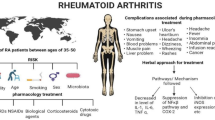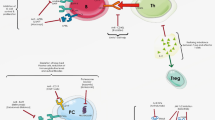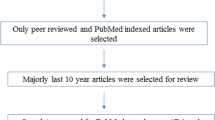Abstract
Animal models of inflammatory bowel disease have provided insight in the regulation of mucosal inflammation. This has resulted in novel therapeutic approaches that specifically target a single inflammatory mediator. Monoclonal antibody therapy has been used in steroid refractory Crohn's disease patients. Anti‐TNF antibody administration induced complete remissions and few side effects were observed. Although these findings need to be confirmed in controlled and long term treatment studies they may guide the development of specific and effective therapies for these diseases.
Similar content being viewed by others
References
Powrie F, Correa‐Oliveira R, Mauze S, Coffman RL. Regulatory interactions between CD45RBhigh and CD4RBlow CD4+T cells are important for balance between protective and path ogenic cell‐mediated immunity. J Exp Med 1994;179:589‐600.
Hollander GA, Simpson SJ, Mizoguchi E, Nichgiannopoulou A, She J, Gutierrez‐Ramoz JC, Bhan AK, Burakoff SJ, Wang B, Terhorst C. Severe colitis in mice with aberrant thymic selec tion. Immunity 1995;3:27‐38.
Duclos B, Reimund JM, Lang JM, Coumaros B, Chambuard P, Lehr L, Baumann R, Koehl C, Weill JP, Monoclear cell activa‐tion in Crohn's disease. Evaluation using serum assay of neopterin and interleukin 2 soluble receptors. Gastroenterol Clin Biol 1990;14:22‐7.
Crabtree JE, Juby LD, Heatley RV, Lobo AJ, Bullimore DW, Axon ATR. Soluble interleukin 2 receptor in Crohn's disease: relation of serum concentration to disease activiti. Gut 1990;31:1033‐36.
Schreiber S, Readler A, Conn AR, Rombeau JL, MacDermott RP. Increased in‐vitro release of soluble interleukin 2 receptor by colonic lamina propria mononuclear cells in inflammatory bowel disease. Gut 1992;33:236‐41.
Matsuura T, West GA, Youngman KR, Klein JS, Ferraris L, Fiocchi C. Soluble Interleukin 2 and CD8 and CD4 receptors in inflammatory bowel disease. Gastroenterology 1992;102:2006‐14.
James SP. Remission of Crohn's disease after human immuno‐deficiency virus infection. Gastroenterology 1988;95:1667‐9.
Pospai D, Rene E, Beaugery L, Reimund JM, Cellier C, Buclos B, Barbier JP, Le Quintrec Y, Mignon M. Crohn's disease stable remission after human immuno‐deficiency virus (HIV) infec tion. Gastroenterology 1994;106:A755.
van der Lubbe PA, Reiter C, Miltenburg AM, Kruger K, de Ruyter AN, Rieber EP, Bijl JA, Riethmüller G, Breedveld FC. Treatment of rheumatoid arthitis with a chimeric CD4 monoclonal antibody (cMT412): immunopharmacological aspects and mechanisms of action. Scand Immunol 1994;39:286‐94.
Walker C, Herzog C, Rieber P, Riethmüller G, Müller W, and Pichler WJ. Anti‐CD4 antibody treatment of patients with reumatoid arthritis: II. Effect of in vivo treatment on in vivo proliferative response of CD4 cells. J Autoimmunity 1989;2:643‐9.
Moreland LW, Bucy RP, Tilden A, Pratt PW, Lobuglio AF, Khazaeli M, Everson MP, Daddone P, Ghrayeb J, Kilgarriff C, Sanders ME, Koopman WJ. Use of a chimeric monoclonal anti‐CD4 antibody in patients with refractory rheumatoid arthritis. Arthritis and Rheumatism 1993;36:307‐18.
Deusch K, Reiter C, Mauthe B, Riethmüller G, Classen M. Chimeric monoclonal anti‐CD4 antibody therapy proves effective for treating inflammatory bowel disease. Gastroenterology 1992;102:A615 (Abstr.).
Stronkhorst A, Radema S, Yong S‐L, Bijl H, ten Berge IJM, Tytgat GNJ, van deventer SJH. CD4 antibody treatment in patients with active Crohn's disease. 1996.
Radema SA, Stronkhorst A, Bijl H, Tytgat GNJ, van Deventer SJH. Anti‐CD4 therapy decrease epithelial expression of HLADR molecules in patients with Crohn's disease. Inflammatory Bowel Disease 1995;1:193‐7.
Wang Z, Dudhane, Orilkowsky T, Clarke K, Li X, Darzynkiewicz Z, Hoffmann WK. CD4 engagement induces Fas antigen‐dependent apoptosis of T cells in vivo. Eur J Immunol 1994;24:1549‐52.
Allison PJ, Kummel MF. The Yin and Yang of T cell costi mation. Science 1995;270:932‐3.
Watehouse P, Penninger JM, Timmes E, Wakeham A, Shahinian A, Lee KP, Thompson CB, Griesser H, Mak Tw. Lymphoproliferative disorders with early lethality in mice deficient in Ctla‐4. Science 1995;270:985‐8.
Hommes DW, Radema SA, Jansen J, Smit F, Fockens P, Ceska M, Tytgat GNJ, van Deventer SJH. Production and cellular source of interleukin‐8 in ulcerative colitis. Inflammatory Bowel Disease 1995;1:108‐16.
Izutani R, Elwyn YL, Reinecker H‐C, Ohno Y, Fusunyan RD, Lichtenstein GR, Rombeau JL, MacDermott RP. Increased expression of interleukin‐8 mRNA in ulcerative colitis and Crohn's disease mucosa and ephithelial cells. Inflammatory Bowel Disease 1995;1:37‐47.
Sartor RB. Insights into the pathogenesis of inflammation bowel diseases provided by new rodent models of spontaneous colitis. Inflammatory Bowel Disease 1995;1:64‐75.
Powrie F, Leach MW, Mauze S, Menon S, Barcomb Caddle L, Coffman RL. Inhibition of Th1 responses prevents inflammatory bowel disease in scid mice reconstructed with CD4RBhi CD4+ T cells. Immunity 1994;1:553‐62.
Co MS, Queen C. Humanized antibodies for therapy. Nature 1991;351:501‐2.
Van Dullemen HM, van Deventer SHJ, Hommes DW, Bijl HA, Jansen J, Tytgat GNJ, Woody J. Treatment of Crohn's disease with anti‐tumor necrosis factor chimeric monoclonal antibody (cA2). Gastroenterology 1995;109:129‐35.
Van der Poll T, van Deventer SHJ, Hack E, Wolbink GJ, Aarden LA, Büller HR, ten Cate W. Effects on leukocytes after injection of tumor necrosis factor into healthy humans. Blood 1992;79:693‐8.
Neurath MF, Fuss I, Kelsall BL, Stüber E, Strober W. Antibodies to interleukin 12 abrogate established experimental colitis in mice. The Journal of Experimental Medicine 1995;183:1281‐90.
Ley K, Gaehtgens P, Fennie C, Singer MS, Lasky LA, Rose SD. Lectin‐like cell‐adhesion molecule 1 mediated leukocyte rolling in mesenteric venules in vivo. Blood 1991;77:2553‐5.
von Adrian UH, Chambers LD, Mc Evoy LM, Bargatze RF, Arfors KE, Butcher EC. Two‐step model of leukocyte‐endothelial cell interaction in inflammation: distinct roles of LECA‐1 and the leukocyte β2 integrines in vivo. Proc Natl Sci USA 1991;88:7538‐42.
Lawrence MB, and Springer TA. Leukocyte roll on a selectin at physiologic flow rates: distinction from and prerequisite for adhesion through integrines. Cell 1991;65:859‐73.
Albelda SM, Smith CW, Ward PA. Adhesion molecules and inflammatory injury. FASEB 1994;8:504‐12.
Furie MB, Randolph GJ. Chemokines and tissue injury. Am J Pathol 1995;146:1287‐301.
Bussoline F, Camussi G. Platet‐activating factor produced by endothelial cells. A molecule with autocrine and paracrine properties. Eur J Bioch 1995;229:327‐37.
Wallace JL, Higa A, McKnight GW, MacIntyre DE. Prevention and reversal of experimental colitis by a monoclonal antibody which inhibits leukocyte adherence. Inflammation 1992;16:343‐54.
Meenan J, Hommes DW, Mevisen M, Dijkhuizen S, Soue H, Büller HR, ten Kate FJW, Tytgat GNJ, van Deventer SJH. Attenuation of rabbit colitis by neutrophil inhibitory factor, a novel β2 integrin inhibitor. Scand J Gastroenterol. In press.
Podolsky DK, Lobb, King N, Benjamin CD, Pepinsky B, Sehgal P, deBeaumont M. Attenuation of collitis in the cotton‐top tamarin by anti‐α4 integrin monoclonal antibody. J Clin Invest 1993;92:372‐80.
Issekutz TB. Inhibition of vivo lymphocyte migration to inflammation and homing to lymphoid tissues by the TA‐2 monoclonal antibody: A likely role for VLA‐4 in vivo. J Immunol 1991;147:4178‐84.
Author information
Authors and Affiliations
Rights and permissions
About this article
Cite this article
van Deventer, S., Camoglio, L. Monoclonal antibody therapy of inflammatory bowel disease.. Pharm World Sci 19, 55–59 (1997). https://doi.org/10.1023/A:1008677225956
Issue Date:
DOI: https://doi.org/10.1023/A:1008677225956




